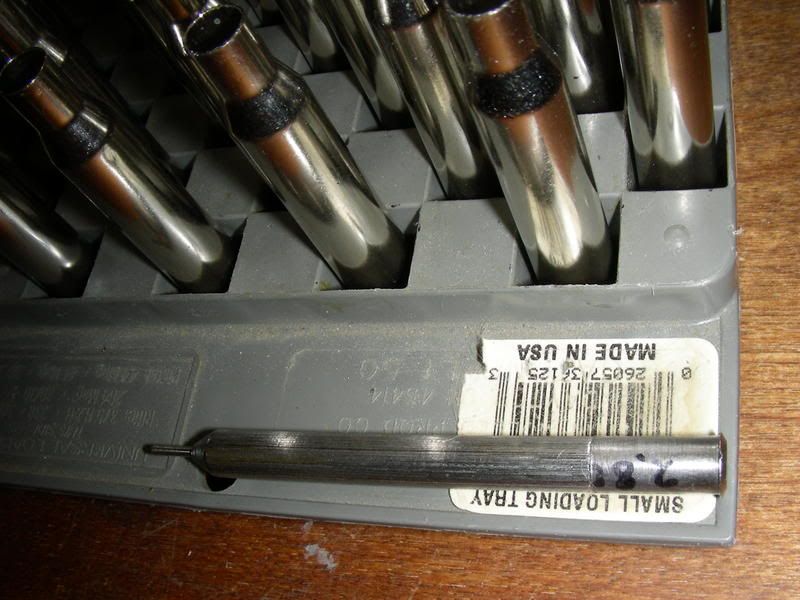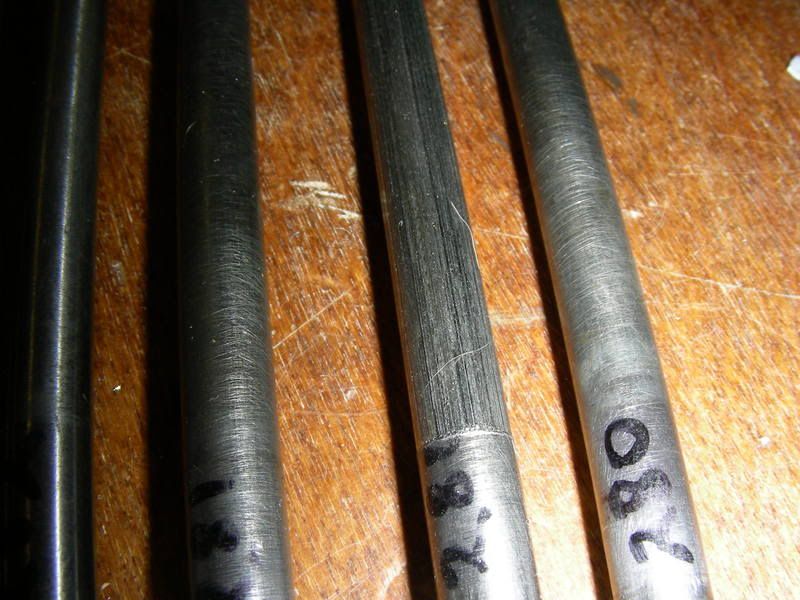

 The Accurate Reloading Forums
The Accurate Reloading Forums  THE ACCURATE RELOADING.COM FORUMS
THE ACCURATE RELOADING.COM FORUMS  Guns, Politics, Gunsmithing & Reloading
Guns, Politics, Gunsmithing & Reloading  Reloading
Reloading  Maybe once and for all--can NP brass scratch dies?
Maybe once and for all--can NP brass scratch dies?Go  | New  | Find  | Notify  | Tools  | Reply  |  |
| one of us |
I would like people to weigh in who know, I was told a long time ago that the plating on NP brass was not hard enough to scratch dies as it was softer than the metal used to make dies. I have loaded a lot of NP brass and never had an issues, but I would welcome knowledgeable input. | ||
|
| One of Us |
No way can NP brass can scratch a loading die. I have loaded tens of thousands of .38,357mag NP brass and the die is as good as new. Gulf of Tonkin Yacht Club NRA Endowment Member President NM MILSURPS | |||
|
| One of Us |
The plating on brass is soft ________________________________________________ Maker of The Frankenstud Sling Keeper Proudly made in the USA Acepting all forms of payment | |||
|
| one of us |
No, NP brass will not scratch a Die, at least in the RCBS F/L Dies which I use for the cartridges for which I use NP brass; 38 Spl/357 Mag, 25-06 Remington, 30/06 Sprg, 300 WM, 300 Weatherby (all R-P) & 375H&H (Federal). It will scar both the Dies & the brass though if dirt & grit are not removed prior to lubing & sizing but that goes for any brass that's not clean and run through a sizer Die. I also use Lee Case Gauge Tools which for me speed the trimming process when used with an eletric screwdriver or drill press. The Lee cutters dull quickly when used on NP brass. Cheers, Number 10 | |||
|
| One of Us |
Physically impossible. Steel is harder than nickle period. As stated above it is grit stuck to the brass that scratches. | |||
|
| One of Us |
I know how this false rumor got started; in the dark ages when shooters used a lot of 38 special nickel plated cases,, and dies were not as hard, and shooters didn't clean their brass like they do now, the dirty, gritty brass caused the dies to score inside. Then, after that happened, every piece of brass that went through that die was scratched and I have seen them with striations all over them. This is from personal experience; my Grandfather was a game warden and loaded for all his DNR (Conservation Commission back then) buddies. We had a range out back with the pond dam as the target berm. The old Star loader's dies were scratched all to hell but they didn't care. That was in the mid 1950s. But is wasn't the brass that caused it. Nickel plated brass just shows scratches well. So, clean your brass and you will never have scratched dies. But now with carbide dies , you won't either. | |||
|
| One of Us |
I have had to clean a sizing die and a Lee FCD die several times due to nickel flaking off and sticking to the carbide insert. It puts "racing stripes" down the cases until you notice and clean the die. I believe that a hardened steel can have a hardness of around 2000 MPa and Nickel can have a hardness of around 3000 MPa, but I could be wrong. | |||
|
| One of Us |
No worries on this subject. I hope you have'nt any other concerns. If so take them there ,this one is in the bag. Never mistake motion for action. | |||
|
| One of Us |
A scratch in the die can't scratch the brass. What happens with nickle plate is that if it flakes off (usually from the case mouth) it will stick in the die and scratch the case. To scratch a case somthing has to be above the surface of the die. A light outside champher will avoid problems. Once the nickle is irined onto the die it is a bitch to remive. | |||
|
| one of us |
Good feedback folks, I will consider this one asked and answered once and for all. | |||
|
| one of us |
For bottleneck cartridges used in bolt rifles I much prefer using the Lee Collet die, particularly for nickled cases. Its squeezing action, as opposed to a conventional die's shearing action, avoids marring the cases when accidental dirt or grit is present. It also does not wear the plating off of the cases as conventional dies tend to do. And best of all, it require no messy lubrication. | |||
|
| One of Us |
To prevent NP cases in my .270win to damage my Redding die, I bought a Foster FL die. I use Imperial Wax with the sizing process. I was supprised as how easy the case went in the die and how easy it came out. I am glad to hear that it cannot scratch the die. | |||
|
One of Us |
I got some 280 WW nickel plated brass since that was all I could find. Like most Winchester brass, some of the necks were dented and the ID's varied, so as typical, I ran a Lee Collet mandrel down the necks to expand and uniform them   ruined that mandrel Now probably the steel of the Lee mandrels are not "hardened". If the nickel brass was to scratch a regular die, it would do so where the mouth of the case hits the forcing cone up inside where it is not readily apparent. So damage may not be so easily identified Another opinion http://www.varmintal.net/arelo.htm#Nickel_Brass
____________________________________ There are those who would misteach us that to stick in a rut is consistency - and a virtue, and that to climb out of the rut is inconsistency - and a vice. - Mark Twain | Chinese Proverb: When someone shares something of value with you and you benefit from it, you have a moral obligation to share it with others. ___________________________________ | |||
|
| Powered by Social Strata |
| Please Wait. Your request is being processed... |
|
 The Accurate Reloading Forums
The Accurate Reloading Forums  THE ACCURATE RELOADING.COM FORUMS
THE ACCURATE RELOADING.COM FORUMS  Guns, Politics, Gunsmithing & Reloading
Guns, Politics, Gunsmithing & Reloading  Reloading
Reloading  Maybe once and for all--can NP brass scratch dies?
Maybe once and for all--can NP brass scratch dies?

Visit our on-line store for AR Memorabilia

